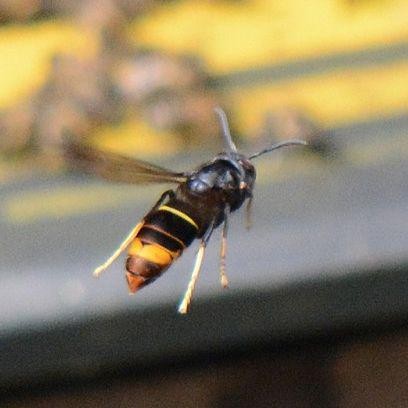Alldrain Bee Colony Withstands Asian Hornet Threat
Over recent months, the beehive at Alldrain’s site has faced threats from Asian hornets. An inspection by LeaseBees, from whom we lease our colony, confirms that our bees are holding their ground.

The LeaseBees inspection report states: “Inside the hive, we saw exactly what we want to see: life. The hive clearly functions as a small biodiversity hub in the immediate area.”
That was precisely our goal when we decided to provide housing for a bee colony at Alldrain’s business park. In line with our commitment to sustainability and biodiversity, Alldrain partnered with LeaseBees. By placing a beehive on our premises, we’re contributing to the conservation of these essential pollinators.
A healthy bee population benefits the entire ecosystem: increased pollination for shrubs and trees, more food for other insects and birds. It creates a chain reaction of life. Additionally, the bees’ presence raises awareness among employees and neighbors.

Protective measures
The colony’s strong condition isn’t a given, as our bees—like many others across Flanders—face threats from the Asian hornet.
Last season focused heavily on implementing protective measures to shield the bees from this predator.
While no single measure offers 100% protection, it’s notable that Alldrain’s strong, compact colony combined with smart hive design is making a real difference.
We’ve installed reduced entrance openings in the hive, allowing bees to fly in and out easily while making it difficult for larger predators like the Asian hornet to enter.
By creating a calm, short flight path, we’ve ensured the bees spend less time airborne and vulnerable. Placement near shrubs provides the bees with additional cover.
Ongoing monitoring and rapid intervention remain essential to protect the bees by tracking hornet sightings on and around the site so they can be dealt with promptly.
Hive and colony in winter mode
In the coming weeks, the beehive will transition into winter mode. We’ll be monitoring whether the bees have sufficient winter stores to get through the cold period.
If reserves are inadequate, we’ll supplement with honey rather than sugar.
The hive’s entrance openings remain small and low to protect the colony from drafts and unwanted visitors, while maintaining ventilation to prevent condensation.
During our bee colony’s brood break, LeaseBees will administer a winter treatment against varroa mites, ensuring the bees can start spring in good health. We’re already looking forward to watching them take flight again come spring.
